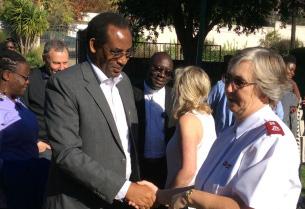
1 minute read
Background to the Consultation
from Africa Anti-trafficking Consultation Booklet
by International Social Justice Commission - The Salvation Army
The Salvation Army (AHT International Program) and the Anglican Alliance held their first regional consultation in Cape Town, South Africa on 2-6 May 2016. A second regional conference was held for the region of Asia shortly after in September 2016
The purpose of the consultation was to strengthen our capacity as churches for an effective response to human trafficking across Africa. The consultation explored: • Defining best practice with a focus on prevention • Care and support for survivors • Policy and advocacy work
The issue of trafficking/slavery is a growing global crisis, with recent estimates of 30-45 million people oppressed in slavery in almost every part of the world, including within Africa and from Africa to other regions. Trafficking/slavery has been raised as a priority in all of the Anglican Alliance regional consultations as well as in Salvation Army global and regional fora.
Focus of the meeting: • Trends of modern slavery / human trafficking within Africa and to/from Africa • Learning from survivors’ experiences • Aspects of modern slavery: for labour, sexual exploitation, trafficking of children, trafficking for cultural reasons and organ trafficking • Response to modern slavery by governments, regional and international bodies • Evidence and best practice for effective responses by churches • A time of prayer and reflection to deepen/share our faith foundations for this work
Outcomes: 1. Regional mapping of Anglican, Salvation Army and other faith-based initiatives – identifying best practice and data gathering. 2. Agreed strategy on areas of response, including ecumenical and government partnership, with a focus on prevention, including awareness raising in local churches. 3. Initial concepts for a tool kit for local, regional and national church responses.
Participants There were 20 participants drawn from the Salvation Army, Anglican provinces and Caritas offices in Africa, all in key positions to take this work forward. Speakers from the United Nations International Organisation for Migration, The Deputy Home Minister for South Africa, a survivor activist, Stop The Traffik UK, as well as local Anti-Human Trafficking organisations, also attended some sessions.










